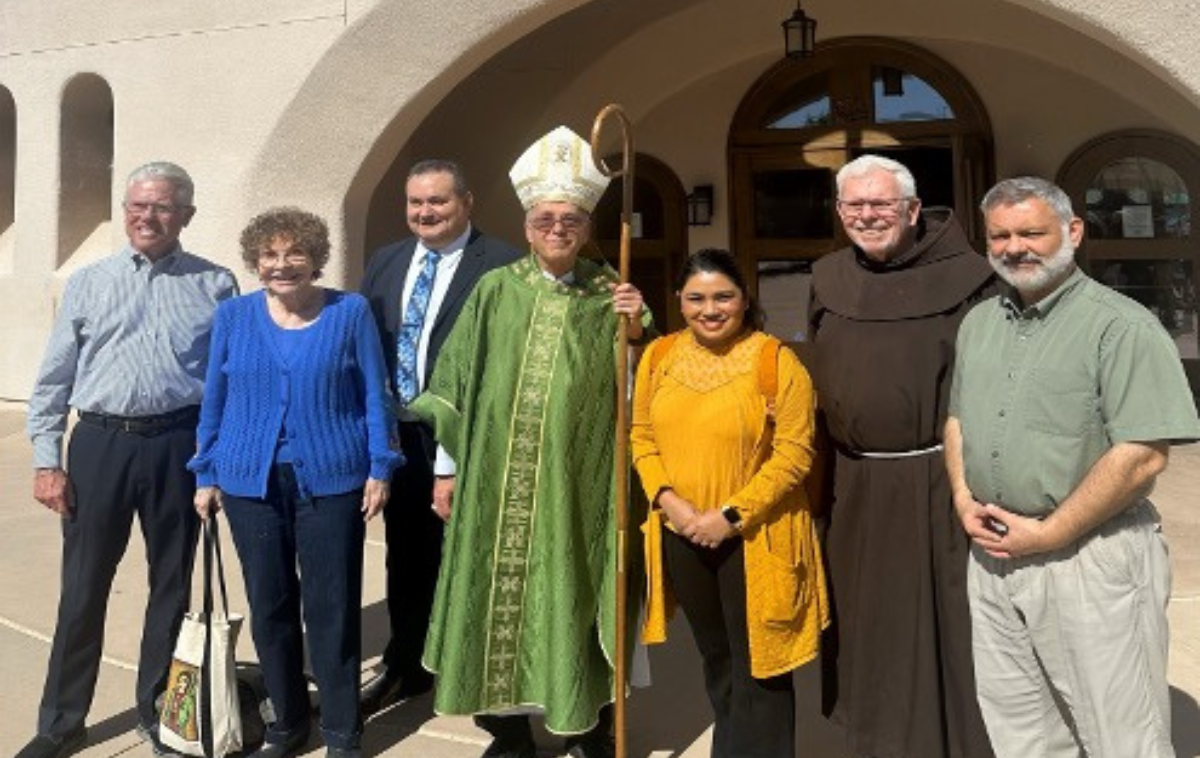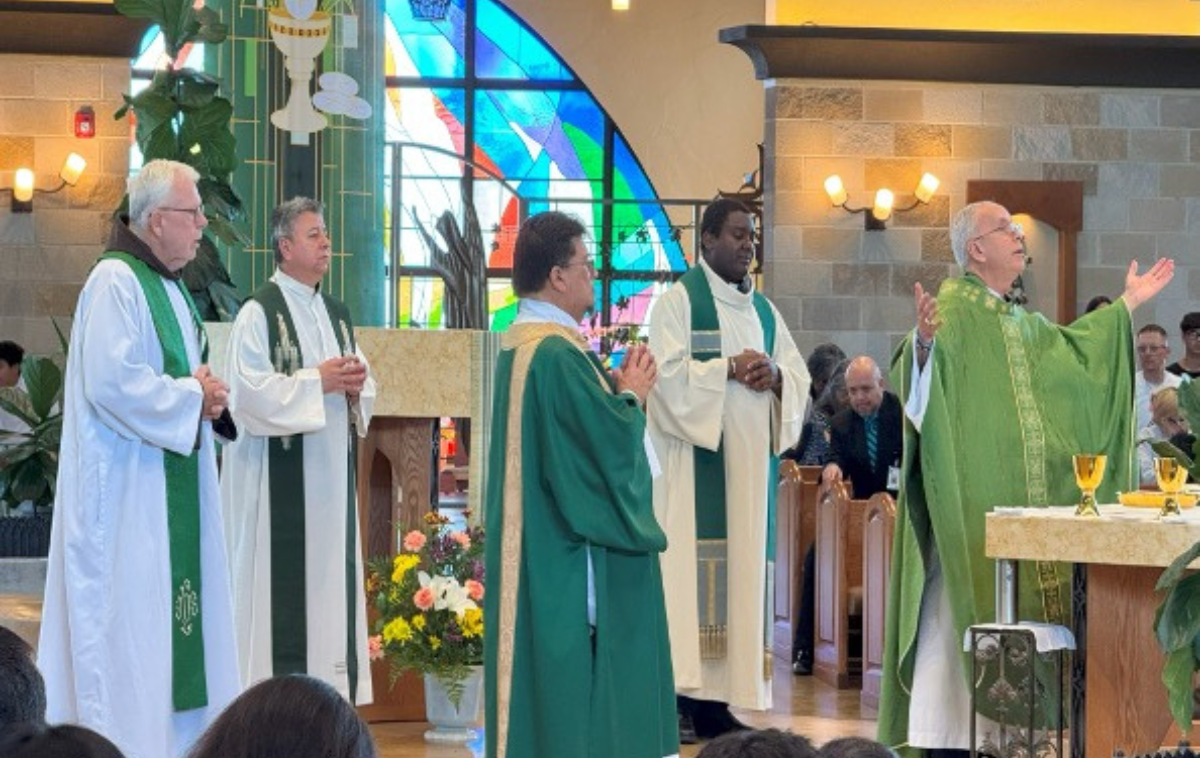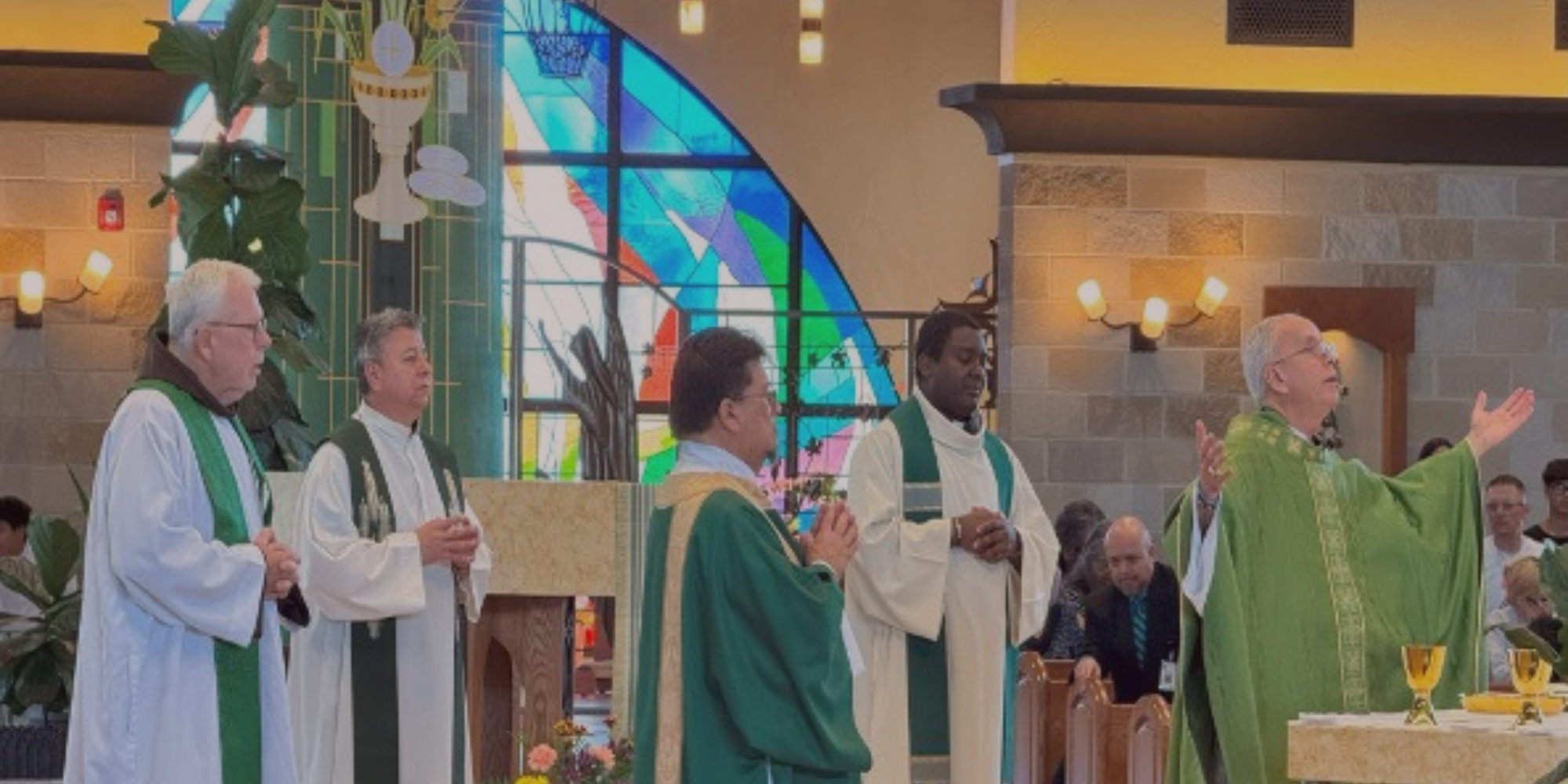Friars promote Laudato Si’ Action Plan in Texas
Date Published: November 02, 2024
By Ignatius Harding, OFM
Our friars from the Cabrini Border Migrant Ministry Fraternity – Brothers Jim McIntosh, OFM, Maikel Gomez, OFM, and I – are serving in various roles to help the Diocese of El Paso, Texas, make a formal commitment to the seven-year Laudato Si’ Action Program for Dioceses and Religious Life.
Hearing and responding to the cry of the earth and the cry of the poor is the theme of Pope Francis’ 2015 encyclical, “Laudato Si’.” The encyclical's title takes its name and inspiration from the first words of St. Francis of Assisi’s Canticle of the Creatures. In medieval Italian, it means “Praise Be to You,” a phrase repeated throughout the Canticle praising God for the sun, moon, stars, water and all creation.
A newly formed El Paso Diocesan Laudato Si’ Commission will inform and encourage action on behalf of our common home in the diocese’s parishes. One of the commission’s initiatives is to help promote the formation of “Laudato Si’ Circles,” or care of creation ministries.
The mission of Laudato Si’ Circles is to inspire and mobilize the global Catholic community and the whole Franciscan family to care for our common home. Laudato Si’ Circles meet regularly to deepen their relationship with God as creator and all members of creation.
Together, they pray with and for creation, reflect on their ongoing ecological conversion, and act. If you want to join or start a Laudato Si’ Circle or Care of Creation Ministry in your fraternity, parish, school, or another ministry, please contact any of the friars here in El Paso.

Pictured with Bishop Seitz is part of the new extended Diocesan Laudato Si' Action Team of the Diocese of El Paso. From left to right: Alan Simpson, Jean Soto, Arturo Caraveo, Bishop Mark Seitz, Cynthia Gonzalez, Franciscan Br. Ignatius Harding, and Marco Reposo, Director of El Paso JPIC.
An urgent need for action
Two years after the United States Conference of Catholic Bishops approved the Action Program, only 32 dioceses have made a formal commitment to implement it.
Care for creation and care for the poor are tremendous, formidable challenges for all of us, but we don’t have to do it alone. We are called to act on behalf of creation to recognize our special responsibility to human life and to see that we are called to cooperate with the gift of life and never take life from any portion of creation.
We are called to receive, love and care for all of God’s creations. Beginning with our lives and every human being around us, we must respect their human dignity and, from there, love, care for and lovingly use all God has given us in this beautiful world.
Everyone and every organization must begin doing something. Our El Paso Diocesan Laudato Si Action Team can provide brief bilingual videos, posters, bulletin inserts, summary texts and PowerPoints. We can even come to your parish and help you get started.
Let’s just get started.

Mark Seitz, Bishop of El Paso Diocese, with concelebrants Br. Ignatius Harding and Fr. Benjamin Flores, pastor of St. Frances Xavier Cabrini Catholic Parish, at the solemn closing of the 2024 “Season of Creation” on the feast of St. Francis of Assisi 2024.
Commemorating the Season of Creation in Texas
Bishop Mark Sietz celebrated the end of the Season of Creation with a Mass at St. Frances Xavier Cabrini Parish in El Paso on Oct. 6. The Season of Creation is the annual and universal Christian celebration of praying and responding together to the cry of creation. Every year, the ecumenical family worldwide unites to listen and care for our common home.
The celebration begins on Sept. 1, the feast of creation, and ends on Oct. 4, the feast of Saint Francis of Assisi, the patron saint of ecology.
In his homily, the bishop reminded the congregation of our God-given responsibility as humans to be faithful stewards of creation.
Citing the day’s reading in Genesis, the bishop said we are charged not to dominate creation, but to be caretakers of the earth and all her creatures. Bishop Sietz pointed out, “Human beings have the privilege of using […] creation for their wellbeing, but always, as part of that, there is the understanding that we also have a responsibility to the rest of creation to keep that beautiful balance of creation and to keep healthy all that God has made.”
He also emphasized how “recklessly using the goods of the earth and leaving it trashed goes against the calling in scripture to be stewards of creation. We recognize that we [all of creation] are so integrally related that if they are not healthy, we are not healthy, so we don’t just use creation as if it was something that we use and trash, throw it in the trash, rather we care for it and treat it with respect.”
St. Pope John Paul II called for a global ecological conversion. He wrote of the need for full respect for the human person and concern for the world around us (LS #5). Bishop Sietz also noted that all creation is sacred and should be treated with respect and concern for the good of the entire world and for future generations.
Why we need to care for creation
God as Creator impacts how we treat creation. If Christianity had paid attention to the teachings of Jesus and St. Francis, our planet — Sister Mother Earth, as Francis called her— would be much healthier today. It took until the 21st century for a pope to write an entire encyclical making this clear and demanding.
In Laudato Si’, Pope Francis writes:
“St. Francis, faithful to Scripture, invites us to see nature as a magnificent book in which God speaks to us and grants us a glimpse of his infinite beauty and goodness. ‘Through the greatness and the beauty of creatures one comes to know by analogy their maker’ (Wisdom 13:5); indeed, ‘his eternal power and divinity have been made known through his works since the creation of the world’ (Romans 1:20). The world is a joyful mystery to be contemplated with gladness and praise.”
Br. Richard Rohr, OFM, also comments:
“We have not honored God’s Presence in the elemental, physical world. We made God as small as our own constricted hearts. We picked and chose, saying, ‘Oh, God is really only in my group, in baptized people, in moral people.’
“Is there that little of an infinite God to go around? Do we have to be stingy with God? Why pretend only we deserve God, and that God is not for other groups, religions, animals, plants, the elements, Brother Sun and Sister Moon?
“God is saving creation and bringing all creatures back where they began—into union with their Creator. God loves everything that God has made! God proclaimed all created things ‘good’ (see Genesis 1:9–31 and Wisdom 11:24–12:1).
“But we, with our small minds, can’t deal with that. We must whittle God and love into small parts that our minds can handle and portion out.
“Human love is conditional and operates out of a scarcity model. There’s not enough to go around, just like Jesus’ disciple Andrew said about the boy’s five loaves and two small fish (John 6:9). Humans can’t conceptualize or even think of infinite or eternal concepts. We cannot imagine endless love, infinite goodness, or infinite mercy.
“We don’t come to the God mystery through concepts or theories; we come by connecting with what is—with God’s immediate, embodied presence, which is all around us. Notice that almost all of Jesus’ common stories and examples are nature-based and relationship-based—never once theology or academic theory.
“We have not recognized the one body of Christ in creation. Perhaps we didn’t have the readiness or training. First, there is seeing, and then there is recognizing; the second stage is contemplation.
“We cannot afford to be unaware. We must learn to see, listen, or touch and recognize how broad and deep the Presence is if we are to truly care for our common home.”

